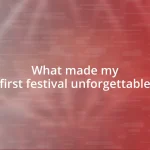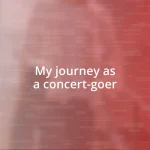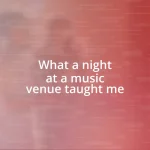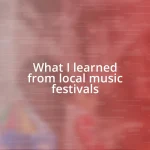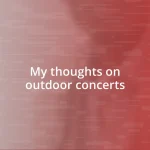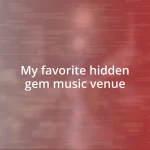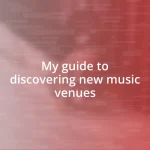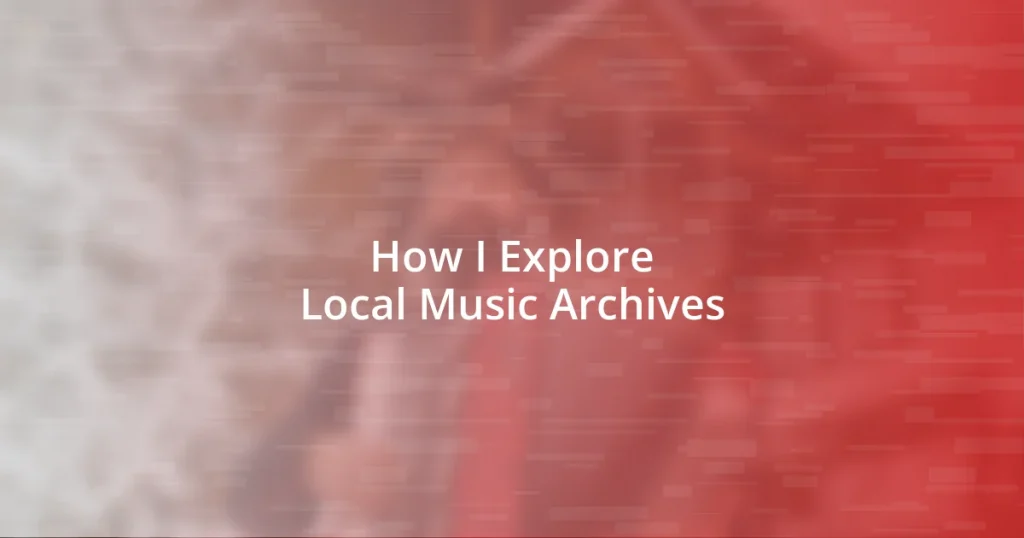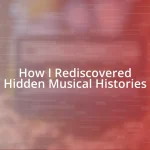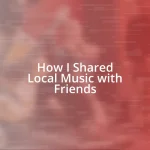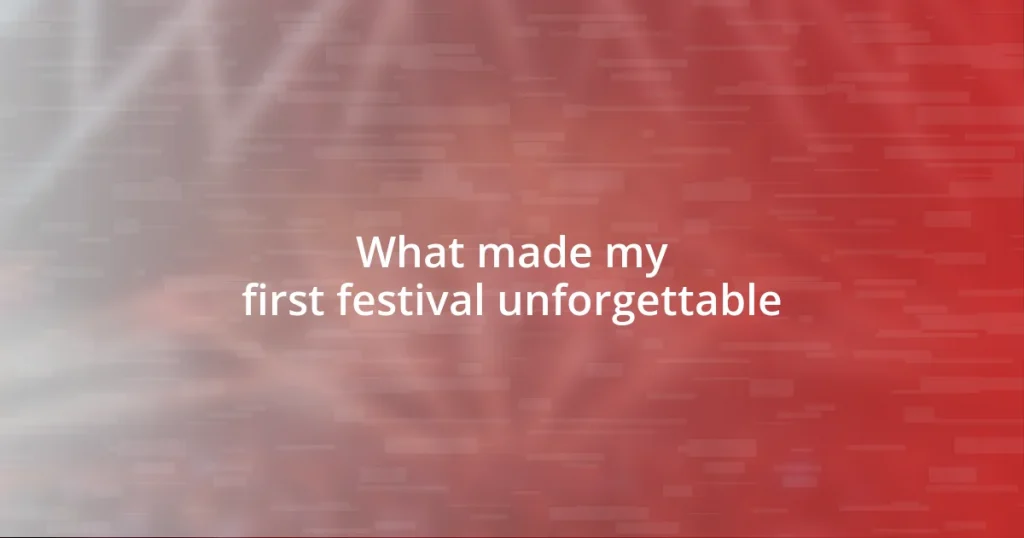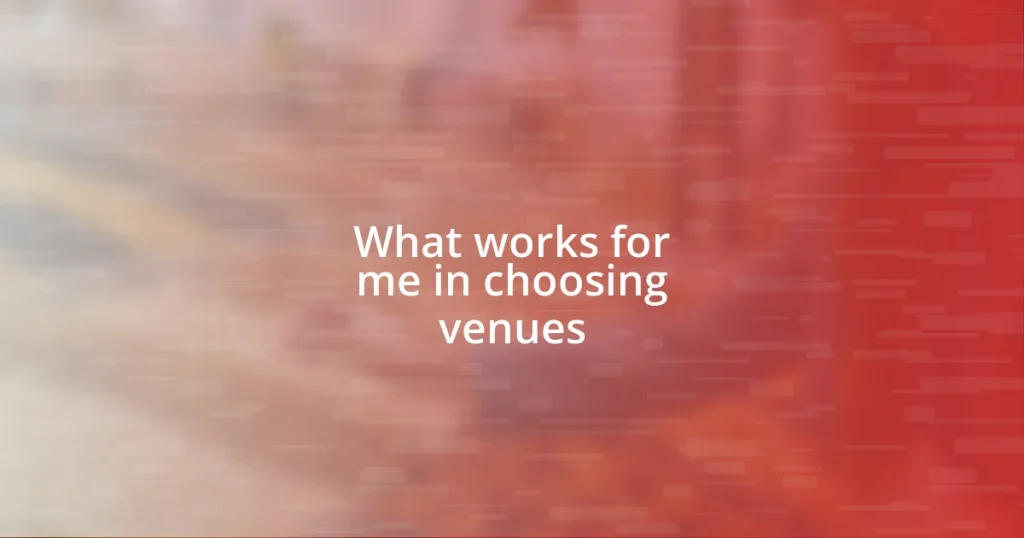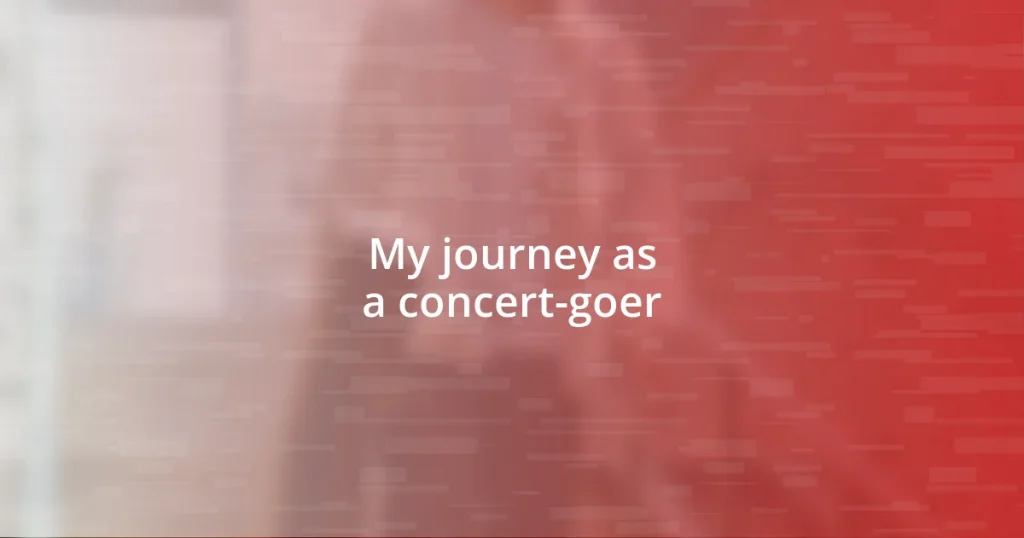Key takeaways:
- Local music archives preserve cultural heritage, creating connections to the past and inspiring new generations of musicians and listeners.
- Engagement with archivists and local musicians deepens the exploration of music history, revealing personal stories and hidden treasures.
- Digitization safeguards local music from physical decay, ensuring accessibility for future generations and promoting community awareness of musical heritage.
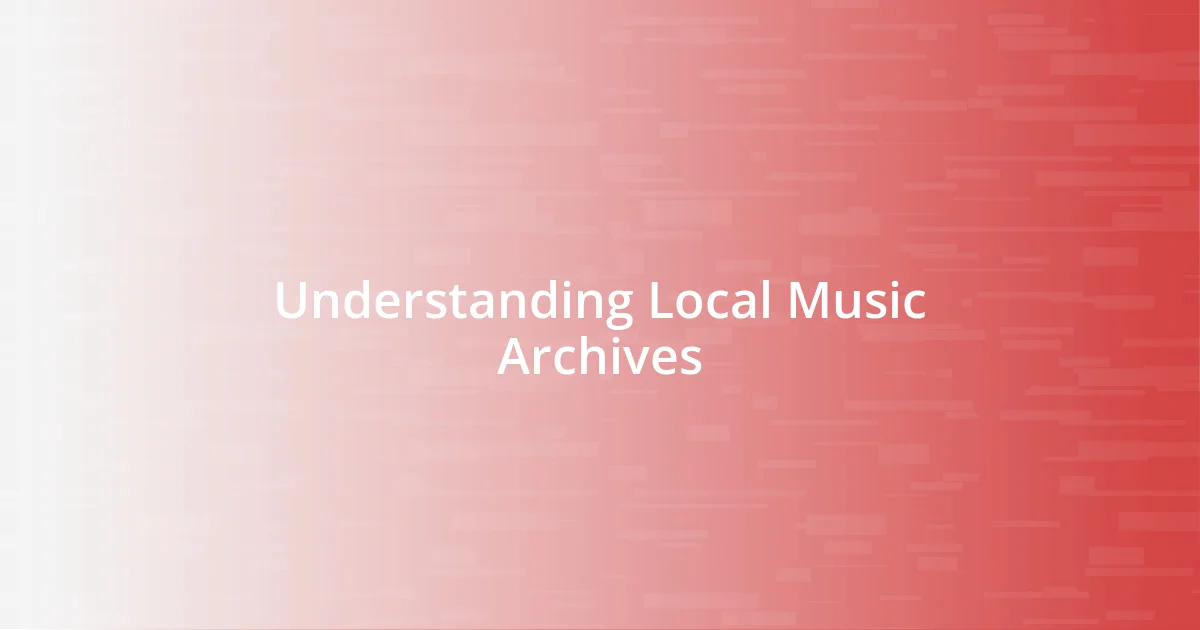
Understanding Local Music Archives
Local music archives serve as treasure troves, preserving the rich tapestry of a community’s musical heritage. When I first stumbled across a local archive, it felt like unearthing a time capsule. The mix of old vinyl records and handwritten notes gave me a rush—did you ever find something that made you feel connected to the past so deeply?
These archives often house recordings that tell unique stories, reflecting the cultural landscapes of their time. I remember listening to a local band’s demo from decades ago—hearing their raw sound and energy transported me back to a different era. It made me wonder: what musical influences shaped their artistry? Each record can be a door into someone else’s world, and that’s incredibly powerful.
Additionally, local music archives are crucial for documenting diverse voices that might otherwise be overlooked. I’ve had the chance to explore the narratives behind those voices, and it struck me how personal and impactful this exploration can be. What songs have been lost to time, and what stories do they still hold? Engaging with these archives not only honors the past but also inspires new generations of musicians and listeners alike.
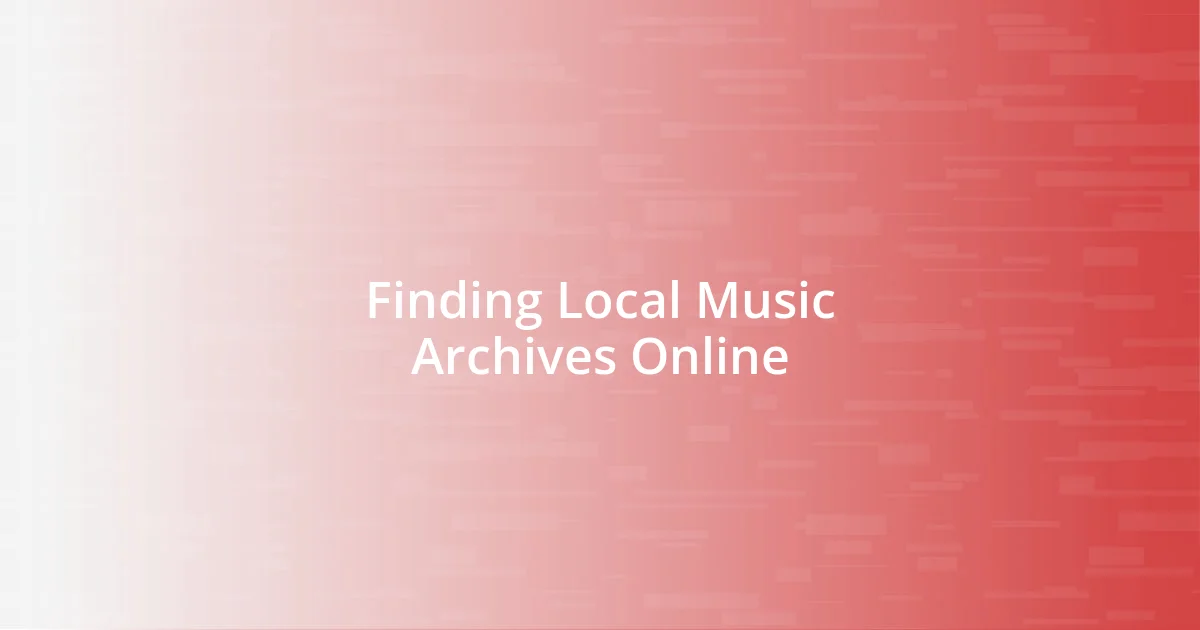
Finding Local Music Archives Online
Finding local music archives online can feel like a digital scavenger hunt. I often find myself diving into various websites, browsing local libraries, and community group pages. Each click brings the thrill of the unknown—will I discover a rare live recording from a beloved local band? It’s exhilarating, especially when I uncover gems that locals treasure but are unknown outside the community’s borders.
Here are some tips for navigating this online space:
– Search Local University Websites: Many universities house special collections in their libraries, which often include music archives.
– Utilize Social Media: Check local music groups or pages dedicated to regional history; they’re often goldmines for old recordings and stories.
– Explore Local Radio Station Archives: Many stations compile music archives from their broadcasts and feature interviews with local musicians.
– Check Digital Library Platforms: Websites like Archive.org or local history-focused sites can yield surprising finds.
– Engage with Local Musicians: They often know where to look or may have personal collections they’re willing to share.
I remember one evening, scrolling through a social media group dedicated to my hometown’s music scene. A post caught my eye—an old clip of a vibrant concert performance I’d never heard of. Chills ran down my spine as I realized it was the band my older brother used to talk about. Moments like these highlight how technology can bridge generations, connecting us with the artistry of those who came before us.

Visiting Archives in Your Area
Visiting local archives is a truly rewarding experience. When I finally walked into my town’s archive, I was instantly enveloped by a sense of discovery. Rows of dusty boxes contained recordings, flyers, and photographs that had stories of their own. The smell of aged paper mixed with excitement as I unraveled histories that weren’t just about music, but about people, lives, and communities.
One particular visit stands out in my memory. I was rifling through some old CDs and stumbled upon a demo tape of a band that used to play at my high school dances. Suddenly, I was flooded with nostalgia, recalling the energy of those nights—dancing with friends, singing along to songs that felt like the soundtrack of our youth. It’s fascinating how a few bars of music can instantly transport us back in time, isn’t it?
Don’t overlook the value of talking to the archivists themselves. I recall chatting with an older gentleman who had spent decades preserving our local music scene. His passion was palpable, and his stories about the musicians who once graced our small stages painted a vibrant picture of the past. I realized that personal connections are often as valuable as the artifacts themselves. Every visit can turn into an adventure, offering richer contexts and deeper meanings behind the music we love.
| Aspect | Experience |
|---|---|
| Access to Materials | Personal interaction with recordings from local musicians. |
| Atmosphere | A mix of nostalgia and curiosity fills the air, enhancing the search. |
| Emotional Connections | Recollections of past memories tied to specific songs or artists. |
| Engagement with Archivists | Direct insights and storied connections to music history. |
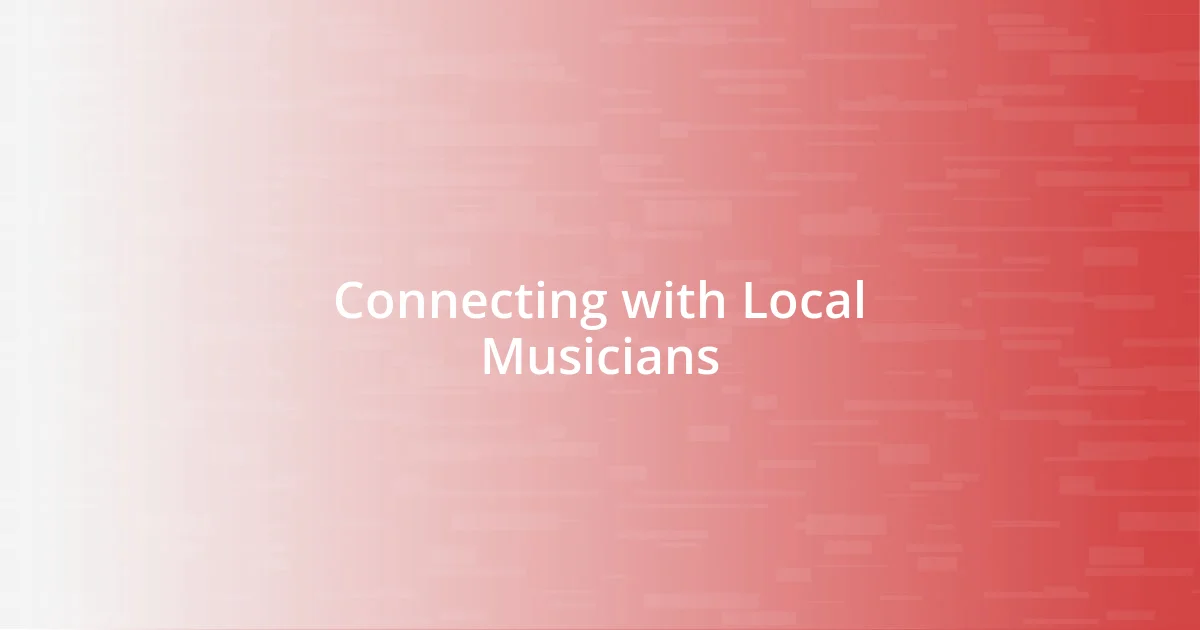
Connecting with Local Musicians
Connecting with local musicians is an essential part of exploring music archives. I often find that sharing my discoveries leads to enriching conversations. At a local open mic night, I met a guitarist who not only played covers but also composed tunes inspired by our town’s history. When I mentioned a vintage recording I found, his eyes lit up, and he eagerly shared stories about the musicians from those days. Isn’t it amazing how music can create an instant bond between people?
Another memorable moment happened during a community festival. As I wandered through artisan booths, I struck up a conversation with a vendor who happened to be a former drummer for a local band. He was more than willing to chat about the band’s heyday and even shared some rare memorabilia that he had tucked away for years. Those personal connections always make me wonder: what hidden stories lie behind each local artist?
I actively seek to connect with musicians through social platforms, too. During one online session, I joined a live-streamed performance by a talented singer-songwriter. As we chatted in the comments, the artist revealed her hidden influences—some were even local legends I had discovered in archives. It felt like peeling back layers; one piece of music led to another, and suddenly I was part of a larger conversation about our community’s rich soundscape. It’s moments like these that show me the impact of connecting with local artists—each interaction enriches my understanding and appreciation of the music itself.

Interviewing Archivists for Insights
Engaging with archivists has become one of my favorite aspects of exploring music archives. I remember one particular afternoon spent at a local archive, where I found myself seated across from an enthusiastic archivist. As we delved deeper into the history of forgotten band flyers, his eyes sparked with excitement when he recounted a heartfelt story of a local musician who had tragically lost their battle with addiction. Such personal anecdotes created an emotional tapestry that brought life to the dusty artifacts surrounding us. Have you ever noticed how a single story can turn historical records into vivid memories?
The insights I gained from that conversation made me appreciate the archivist’s role even more. It wasn’t just about the material; it was the shared passion for preserving our community’s musical legacy. During our chat, he revealed that the archive held a treasure trove of interviews with musicians, capturing their voices and experiences. Imagine uncovering those gems—thoughts and feelings from artists who shaped the very sound of our town! Learning this sparked an idea: why not ask archivists what lesser-known archives or hidden treasures to look for? Their expertise can guide you to the most fascinating finds.
I also remember attending a public talk hosted by an archivist, which opened my eyes to the interconnectedness of local music scenes. Listening to her weave the narratives of different music movements in our area made me reflect on the bigger picture. How much have I overlooked in my own exploration? Her passion was contagious, and I left with new questions swirling in my mind—ones that would lead me back into the archives with even greater enthusiasm. It’s incredible how these interactions not only provide answers but also spark curiosity that can fuel your journey of discovery.
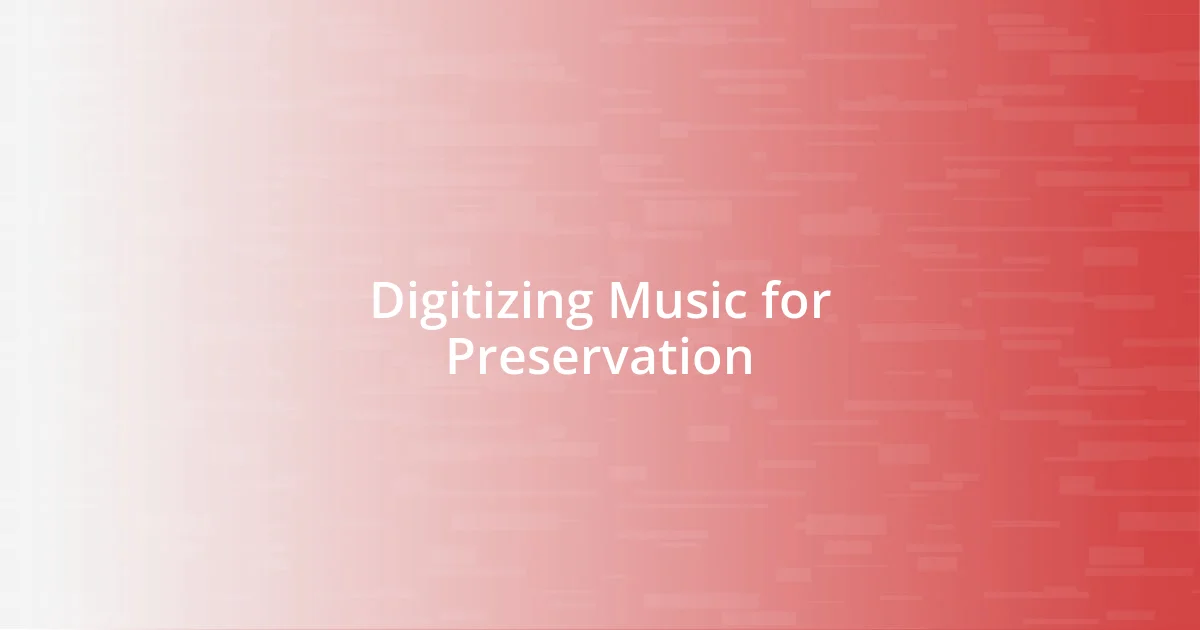
Digitizing Music for Preservation
Digitizing music is a crucial step in preserving our cultural heritage. The first time I witnessed a digitization process at a local archive, I remember feeling a mix of excitement and nostalgia. As technicians carefully transferred fragile vinyl records onto digital formats, I couldn’t help but think about how these recordings would now be accessible to future generations. Isn’t it remarkable how technology can breathe new life into sounds that once echoed in small, forgotten venues?
I often reflect on how digital archives serve as time capsules for our community’s musical past. One afternoon, I spent hours exploring an online database filled with digitized concerts from the 70s and 80s. It transported me back to a time when music was a raw expression of the local spirit, making me wonder: what emotions did those performances evoke in the audience? The ability to listen to remastered recordings not only expands my understanding of local history but also allows me to connect with the very heartbeat of my community.
Moreover, digitization plays a vital role in safeguarding against loss due to physical decay. I’ll never forget a conversation I had with a sound engineer passionate about the preservation of local music. He shared a poignant story about how a flood had damaged an entire collection of recordings, leaving behind silence where vibrant music used to be. That moment reinforced my belief in digitization’s power to protect and perpetuate our shared cultural narratives. How many musical stories are waiting to be saved? It’s an urge that drives me to explore local archives, eager to discover more while ensuring we keep our musical history alive.
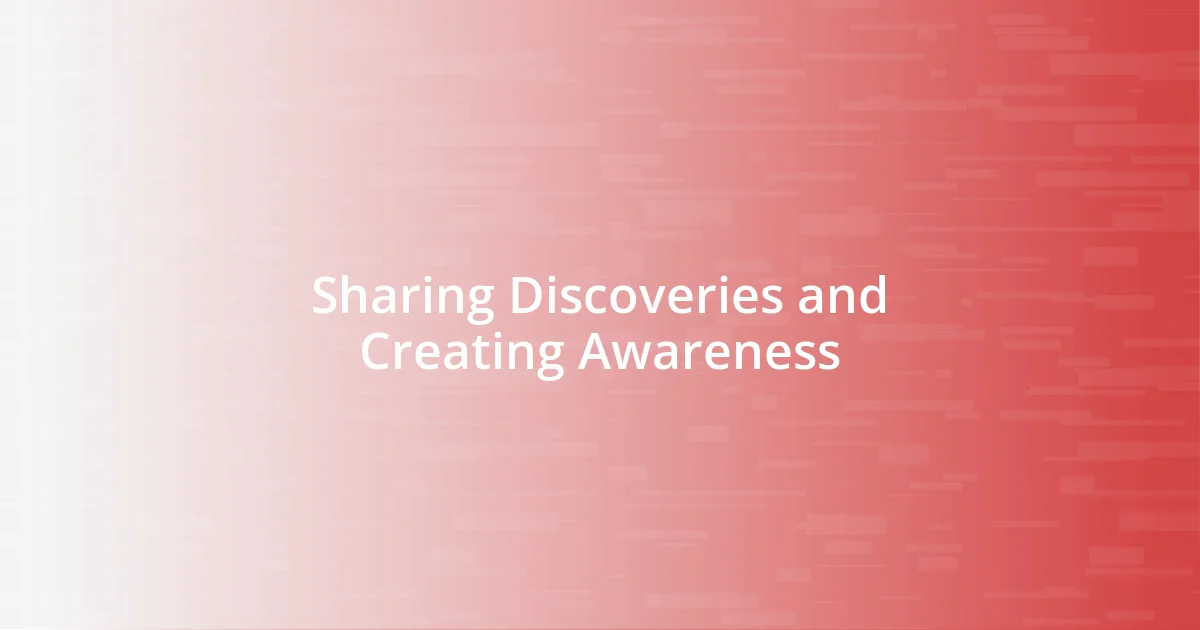
Sharing Discoveries and Creating Awareness
I love the thrill of sharing my discoveries from local music archives with friends and fellow enthusiasts. Just last weekend, I hosted a small gathering at my home where I played some rare recordings I unearthed. The room filled with laughter and nostalgia as we reminisced about the artists and songs that shaped our teenage years. Isn’t it amazing how music can evoke such strong emotions and memories? That shared experience turned my findings into something more significant—a communal celebration of our local culture.
Creating awareness about local music heritage also means utilizing social media platforms. I remember posting about an obscure band I discovered while scanning through worn-out cassette tapes. To my surprise, it sparked an online discussion, leading former fans to reconnect and share their stories. This experience highlighted how the internet can amplify local voices and connect generations. Hasn’t the digital age transformed the way we interact with our history?
Engaging with my community doesn’t stop at what I share; it’s about inviting others to explore archives themselves. A few months ago, I organized a local tour of various music archives, where we uncovered hidden gems together. Watching people marvel at an old concert poster or listen to clips of local legends was truly rewarding. It made me realize that when we create spaces for music lovers to unite, we’re not just sharing knowledge; we’re building a community that honors and cherishes our unique musical heritage. How do you think we can foster more of these connections?
